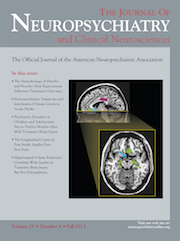To the Editor: Primary progressive aphasia (PPA) is a neurodegenerative disease that was first described as a distinct syndrome by Mesulam, in 1982.
1 It affects the language network located in the left hemisphere of the brain and includes the perisylvian parts of the inferior frontal and temporoparietal regions.
2 It is a disorder of expressive language, with intact comprehension. It is associated with gradual impairment of word-processing, object-naming, poor grammatical structure, and phonemic paraphasias.
1–3 As the illness progresses, the neurodegenerative process extends to adjacent structures and affects other cognitive and behavioral domains.
3 Literature has explored the relationship of PPA with neuropsychiatric illnesses such as dementia and depression; however, psychosis in PPA has not been investigated.
We summarize a case of PPA patient who presented with delusional thinking. To our knowledge, this is the first reported case of PPA with psychosis.
The patient is a 63-year-old woman who is single, never married, childless, living alone, and religious. She graduated from college and held a full-time job until a few years ago. She functioned well and established stable relationships with her relatives. She was diagnosed with PPA by her neurologist 1 year earlier. Her medical history was significant for well-controlled hypertension. She continued to function well despite her language deficits until 1 month before admission, when she was noted to be fearful, irritable, isolating herself, and unable to hold her job. Head CT and laboratory tests were unremarkable. Her speech was halting and agrammatic, without dysarthria. She answered simple questions and was able to name a few objects with cues. She was able to repeat only single words, but no sentences. Her writing was aphasic: when she was asked to write “it is not raining,” she wrote “is not ti running.” She believed that her neighbors were trying to kill her by putting chemicals and poisonous gas in the air ducts of her apartment. She denied depression, suicidality, and hallucinations. She had no neurovegetative symptoms. She was oriented to time, place, and person. There was no personal or family history of psychiatric illness. Her delusion was successfully treated with olanzapine 15 mg daily.
This patient was initially able to maintain her functioning despite her language impairment. This was in the context of her social support network, religious affiliation, and coping strategies. However, she decompensated when she developed psychotic symptoms. This may raise a concern about factors that may influence the functioning of PPA patients other than language deficits. Early identification would allow early treatment and reduced morbidity. The diagnosis of psychosis in the context of inability to verbalize thoughts poses a diagnostic challenge. However, other perspectives of psychosis, including the biological and social influences, can be assessed in these patients. These include personal and family history of psychosis and social isolation. Moreover, focusing on signs more than symptoms of psychosis (e.g., decreased motivation, emotional changes, reduced emotional expression, inability to handle stress, poor self-care, and impairment in personal hygiene) can be helpful.

